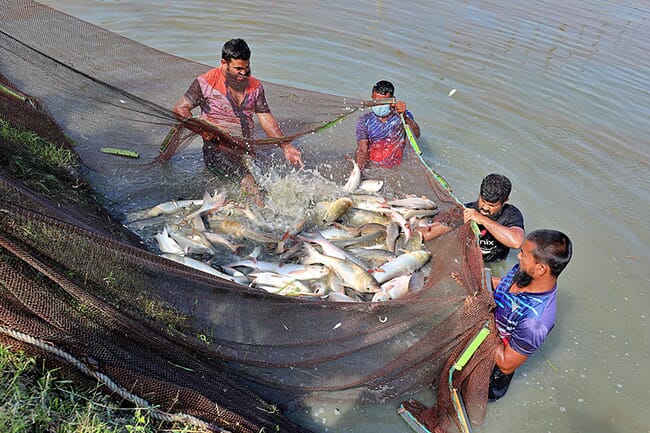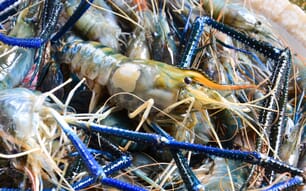
Youth day laborers in the Mymensingh region of Bangladesh net major Indian carp species to perform a regular health check. Researchers with the MSU-based Fish Innovation Lab are working with aquaculture farms in Bangladesh to increase production using genetically improved carp © M Gulam Hussain
As part of the US Government’s Feed the Future programme and funded by the US Agency for International Development, the Fish Innovation Lab works to reduce poverty and improve nutrition, food security and livelihoods in developing countries by supporting research on sustainable aquaculture and fisheries systems.
“Fish are an essential source of animal protein and income for people in developing countries. These new projects expand the Fish Innovation Lab’s work to ensure more people can access fish as part of their diet and benefit from livelihoods in aquaculture and fisheries sectors,” said Dr Mark Lawrence, director of the lab.
Building on the lab’s existing portfolio of 13 research-for-development projects worldwide, the newly awarded grants supports six projects spanning aquaculture and fisheries activities along the fish value chain in Bangladesh, Ghana, Malawi and Zambia. The new projects aim to improve market access for aquaculture producers and consumers, boost aquaculture productivity through genetically improved species, investigate the micronutrient impacts of shellfish in diets, develop vaccines for bacterial diseases in farmed fish, produce insects for fish feed in aquaculture, and explore the ecology and market potential of introduced shellfish.
The projects being funded are:
- Advancing Aquaculture Systems Productivity Through Carp Genetic Improvement (Bangladesh)
- Strategies for an Inclusive Aquaculture Value Chain in Bangladesh: Analysis of Market Access, Trade, and Consumption Patterns
- Micronutrient Impact of Oysters in the Diet of Women Shellfishers (Ghana)
- Piloting integrated insect-to-fish (ITF) farming systems in Malawi
- Development and Investigation of the Delivery Mode of a Multivalent Bacterial Fish Vaccine in Zambia
- Population Ecology and Utilization of the Introduced Crayfish in the Kafue Floodplain and Lake Kariba: Zambia
“The research programme cultivated by the Fish Innovation Lab aims to produce applicable research results, increase the capacity of local partners, and support the adoption of new innovations,” Lawrence said.
MSU oversees and supports the full research portfolio of the Fish Innovation Lab as the programme’s management entity and is the lead research institution for one of the six new projects.




